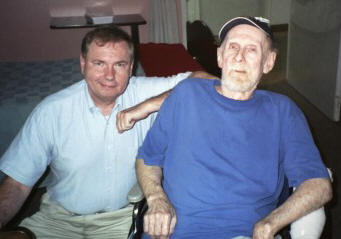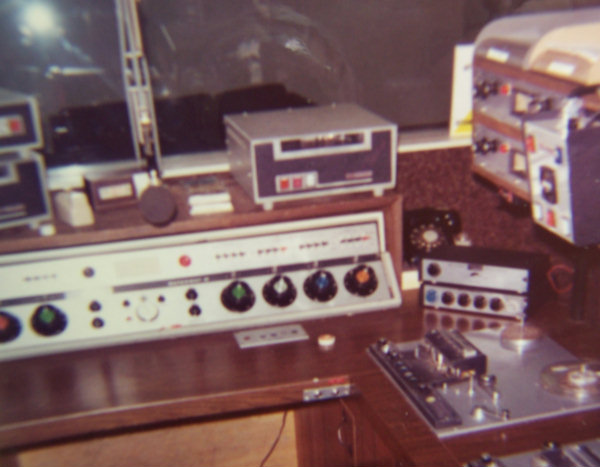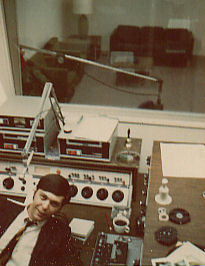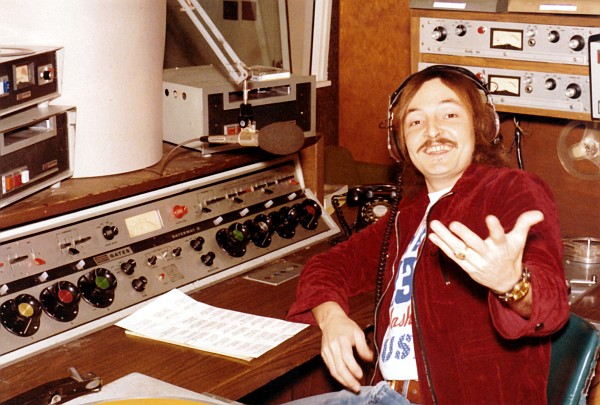|

Mike Griffin and Bill Bailey (July 2005)
What were the duties of the
WAKY Production Director? How much of was fun and how much was "grunt work?"
I don't remember liking the work much. A lot of it was repetitive. In spite of
this, I took a lot of pride in the station and the work. The work involved
producing commercials and promos, scheduling the use of the studio, making
sure music and commercials got carted and on the air, and insuring the studio
was kept up and the product coming out was good. I also ran the transmitter
and did overnight and weekend air shifts. [Download
samples of Mike's airwork on the
Airchecks Page.]
What was a typical day like? Did you work "as long as it took" to get the
job done or did you have to watch your hours?
My hours were 10A-6P. Some days a lot of stuff came in at 5:30. I hated that.
I could work as long as necessary to get things done.
Some Production Directors have a dedicated studio to use. Was that the case
with you? If not, was there a certain time you had to use the studio?
The main production studio was mine. The secondary studio was typically kept
open for the news folks although Gary Burbank also used it as an office
and for show prep when I first came to WAKY.
What were you doing when you weren't in the studio?
WAKY was a directional station
and required a First Class Licensed operator to operate the transmitter. I
took the readings and signed the transmitter log during the day. Occasionally
I would draw strange things on the transmitter log. Which reminds me, one had
some strange rabbit looking figures on it. A black engineer decided that these
strange figures were somehow a racial putdown against him and he complained to
Doc (Earnest Dockery) who was acting chief engineer. I don't know how
Doc handled it but things were okay afterwards and they really weren't racial.
This particular log surfaced again a year or two later when the FCC requested
it as part of a license renewal. The FCC didn't complain about the log but Doc
was concerned about sending in a log with cartoon-like characters on it.
Other than being a misunderstood artist, I'd read or hang out during down
times. Johnny Randolph's office was always a good place to visit.
Randolph was great with stories. I'd also hack electronics, producing a number
of small projects for use at the station.
Then there were the stupid memos
I would write. I recall the station getting a security service to check up on
the studio at night. I started "The Bowser Report" and hung it on the control
room door. It was all about what Bowser, the main guard dog, found that night
and what he recommended for protection. There were some others, but this
series was probably the worst. Then, stupid stuff like Dial-A-Prayer calling
you. Or experimenting with putting subliminals in promos. Usually this was a
repeating track of something like the word "sex" or the sounds of intercourse,
or the sound of bees or of rattlesnakes...any or all of it. I had read about
the techniques after the movie "The Exorcist" came out in '73. There was a
book called "Subliminal Seduction" that was fascinating. These sounds are set
below the level of being noticed or are backwards as in some of the Beatles
songs. The idea is that your subconscious picks up on them and raises your
excitement even though you cannot interpret whether this excitement is for
something good or bad. If enough other good elements accompany the subliminals
they will be interpreted as good. The subliminals only went on a few promos
and the only thing I was ever able to satisfy myself of was that I spent a lot
more time on the promos and that promo production became better and stayed
better.
Did the jocks produce all their spots, or did they just lay down the voice
track and you took care of the rest?
For the daytime jocks it could go either way. Some, like Lee Gray and
Gary Burbank typically had sessions scheduled for paid work at other studios.
When they got off the air they would often, but not always, lay down voice
tracks and run. The night guys typically were responsible for doing all of it.
Jason O'Brian loved production and wouldn't think of anything other
than doing all the work himself.
Were you able to make any
extra money by rolling dubs for agencies for other stations?
Usually the dubs were included
in the buy for the station. If copies went out, the station collected a
nominal fee for them, not me. On several occasions some bigger jobs, say two-
to three-hundred dubs came along. Those were supposed to be extra for me but
it didn't always happen, I suspect sometimes the sales guy may have decided he
deserved a little extra commission.
Did the jocks get paid extra
if another station wanted a dub of a spot they produced for WAKY?
If a spot went out to another station, there was a talent fee. If a particular
jock was requested, the fee might be more than for someone else. Several jocks
derived considerable income from outside spot work. They were protected from
someone trying to get it cheap by coming through the station. Gary Burbank,
Tom Dooley and Lee Gray fell into this category. They did a lot of work at
outside sound studios and the spots weren't always for the Louisville market.
I'm not sure about the other jocks. I don't think Bill Bailey did much
outside voiceover work. He made extra money for live spots on his show, while the
others didn't.

The main WAKY production room in the early '70s
Did you have to attend any
regular meetings as Production Director (sales meetings, meetings with
clients, etc.)?
I typically went to jock meetings. I didn't typically meet with clients;
agency people, but not clients. We did a lot of work with agencies.
Were you responsible for producing non-commercial items such as station
promos, Sunday morning programs, etc.?
Yes, promos, programs, all of that, including production on all of the station
composites from '72 and '73 posted on the Airchecks
Page. Some of the Sunday programming was done by the news department, so
they did all of that themselves. Several other programs involved outside
people who would come in and produce various kinds of programs from interviews
to subversive diatribes. Dick Gregory had a rather interesting view of
the Declaration of Independence that I helped package into a program. We also
did a local version of "Power Line" called "Rock And Soul" for a year or so. I
pitched that one to Randolph, produced the first shows, then taught the young
minister who voiced it to do it all himself.
Once we had a contract with a live "Adult Entertainment" theater that had
replaced one of the movie houses that had closed when 4th street was turned
into the "River City Mall." This contract required that I work (closely) with
some of the girls producing music and sound effects for their acts.
Later, as the super long cuts from albums were becoming popular because of the
growing popularity of FM, I would make custom cuts of some of these. Usually
the 45's put out by record companies were way too hacked so I'd make a five-
to seven-minute version from the longer LP cuts. I remember "Green Grass And
High Tides" by the Outlaws and "Do You Feel Like I Do" by Peter
Frampton as being some of the better cuts that I did. "Do You Feel Like I
Do" went from nearly 15 minutes down to about 6 and I managed to keep all the
"gimmick" stuff. I liked it better. "Green Grass And High Tides" likewise
preserved the best parts of the song, and several other stations played our
cut of it.
Any stories about the sales department fit to print? Favorites and
not-so-favorites?
No particular bad guys. Two especially good guys were Jack Sumner and
Tim Tyler. Jack was good to go to for theatre tickets. (I think Jack
died in '73.) Tim was just an all around decent guy.
Any problems with getting jocks to do their production?
We had boxes set up for each jock. They checked what they had when they got
off the air. It was never a problem.
Did you have anybody working with you doing stuff like straight agency
dubs?
If it wasn't news and involved production, it was me. I did all the agency
dubs.
Did WAKY have a copywriter? Did sales people write their own copy?
Penny Whitaker was "Creative Director." She did most of the in-house
copy writing. She also worked with Johnny Randolph on contests and promotions.
Did you ever have to write
copy or otherwise participate in the pre-studio creative process?
Toward the end of my time I wrote a little, but not much. Otherwise I took
over at the studio door.

Dude Walker in one of the WAKY production rooms
What kind of equipment did the producer have at his disposal? Did you have
EQ, reverb and/or limiting?
Before the Arrival of Engineer John Timm in 1975
The main production room had a Gatesway II console and a pair of two-track
Scully reel-to-reel machines. There were also two cart machines: one that
recorded, the other playback only. The studio also had a Gates Sta-Level that
was modified for fast attack. We could crank in so much compression with it
that the VU would barely move. Usually not too much was used because the air
compression was adequate. There was an equalizer that could be patched in.
There was no reverb -- just tape echo for delay effects.
The second production room contained the old Gatesway console from WAKY's old
Kentucky Home Life control room. The second room had a cart recorder and two
Ampex 350s. There was no EQ, echo or other effects.
After the Arrival of Engineer John Timm in 1975
The main production room became the secondary production room and a new
four-track facility replaced what was the second room.
I don't recall the manufacturer of the new board, but it had slider pots and
EQ on each channel. We had a new four-track Scully and a new two-track Scully.
Seems like there was limiting and compression available, but I don't remember
reverb. We also got a synthesizer so we could make strange sounds, musical
notes, and such.
Do you remember what production and sound effects libraries you had at your
disposal?
We had several libraries. The only one I remember was "The Sounds Of
Broadcasting" (or "SOB"). It was done by the big jingle company that was
located in Memphis [William B. Tanner]. I remember this package because
these guys flew a bunch of Production Directors in from around the country to
talk about ideas for it before they released it. They put us all up at the
Sheraton Peabody, the old hotel that had live ducks in the fountain in its
lobby. We bought this package while WAKY was still owned by LIN Broadcasting
but the library was continously added to the whole time I was at WAKY.
How hard was it to get supplies like reel-to-reel tape, new carts, splicing
tape, etc.?
When I came to WAKY we were doing stupid stuff like rebuilding carts and the
like ourselves. Supplies and such were ordered through the Engineering
Department. This worked okay but we essentially just got whatever tape or such
that the local electronics parts house stocked. Later I got accounts going at
several companies that rebuilt carts and sold tape and other production
supplies. I then ordered whatever and whenever I wanted. We got better tape
stock and the carts came back "factory spec" and were much better.
Was the Engineering Department pretty receptive to your needs as a
Production Director?
Engineering had a regular
preventative maintenance schedule for all the studios, for all equipment in
the station. I don't recall any equipment failures in the studios. Maintenance
was very good. I have written above about John Timm greatly improving
our production facilities.
Did spots on WAKY have to be exactly :60 or :30?
Spot length didn't have to be exact. They could be short, but we wouldn't let
them run over.
What did you do about the problem of recording over cart splices? Did have
an automated splice finder or did the producer have to look for them manually
to avoid them?
When I first came to WAKY splices were a bit of a problem. They weren't being
managed. I started going through all the carts and manually finding the
splices. Happily we got a splice finder in 1973. I also put a VU meter on the
output of the cart machine so we could ensure that the playback levels were
good without having to play the spots back again. Later when we got a
multi-track studio we could bring the cart back into the board through another
channel. On the Gatesway II that we used prior to '76 there was only a monitor
channel. Adding a VU to the playback of the cart recorder improved efficiency
a lot.

Coyote Calhoun in one of the WAKY production
studios
What were the biggest problems you encountered (such as late copy,
incorrect copy, etc.) and how did management respond to them?
Usually this was not a problem. Makegoods were done if necessary but this
happened very seldom.
Who was your immediate supervisor as Production Director? Did you report to
the Program Director, the Sales Manager or the General Manager?
I reported to the Program Director, Johnny Randolph.
Did WAKY do a lot of spec spots?
Very seldom. We often would play a spot for a client for approval before it
aired, but usually the buy was made before any spots were cut.
How much stuff did you voice yourself? What determined whether you voiced
it or somebody else did?
I mostly did tags. We had the best voices in Louisville. Unless a particular
voice was requested, the production was divided between everyone. If a
particular voice was requested there was a fee involved.
Did WAKY archive all commercials on reel? If so, what was that
process/routine like?
We had a huge closet where we put reels alphabetically by sponsor. For a time
we also had reel tapes that we logged items onto. This was something I
introduced but didn't continue. The closet system was better because there was
no good index to the spots on reel. Using a paper catalog and then counting
down 20 cuts on a particular tape to get to the cut you wanted was too much
trouble.
We also used a day reel for production.
We had 31 of them numbered accordingly. The first would be used on the 1st day
of the month, the second on the 2nd, and so on. This caught all the general
production and provided us a backup until that tape cycled in again the next
month. Then it would be bulk erased and we'd start on it again. The idea was
that this tape would catch the promos, tags, voiceovers and easy production,
and provide protection for those items against cart breakage. No catalog was
kept of these tapes, only knowledge of when something might have been cut.
This was somewhat useful but if you got out more than a few days it could be
troublesome. This is why I tried the master reels.
Any rules about doing spots, such as no dry spots?
We tried not to have dry spots, but there were no hard rule.
Any particular coding on the
cart labels so spots would be played in a certain order?
There was no coding on the cart
labels. Spots were always played in the order they appeared on the program
log.
I have heard others say that
WAKY hired the best people, self-starters, and let them do their jobs. This
worked out as well for production as it did for other areas of the station.
Everyone who did production tried to make it sound the best that it could
sound. It was not uncommon that a lot of time was spent just picking out music
and sound effects.
Did programming ever reject commercials or require them to be recut? Were
there any commercials that came in from outside the station that were "too
bad" for WAKY to air?
No, we were whores. Someone brought up the name of a certain auto auto parts
store on the Message
Board. These were possibly the worst. The owner of the business did the
voice work himself. He had a very high-pitched voice that grated. That
statement is just a little extreme, but there was little push back that I can
recall.
It's funny to remember now in this day of political extremes within the two
main parties that in the 1970s we ran spots for Gus Hall for President.
Gus was the head of the American Communist Party and the USSR had a lot of big
bombs aimed at us. Remember Lyndon LaRouche? He was pretty far outside
the mainstream. We ran ads for him for President as a third party candidate
during the '76 election. Of course, we were required by law to run these
political spots, but there was no out-cry from the listeners. These
commercials ran like everything else.
What are some of the things
you learned as Production Director? Would you ever want to do that job again?
In many ways this was a dark period for me (and possibly for radio
production). I would never want this job again. I quit the job after doing it
for a year. Marty Balou was getting ready for college and picked it up
for several months before he headed off. Then for various reasons, some that
don't make much sense today, I took the job again and kept it for six more
years.
Before WAKY I had not worked with multi-track production -- I had no concept
of it. Without multi-track everything had to be mixed down in a single pass or
done in pieces and cut together. With the two-track machines at WAKY when I
first came, a new dimension opened for me: building up spots in layers. Later
with the four-track studio it was even more interesting and I began to add
more elaborate sound effects. Sure, it was still tape and the basics stayed
the same but it was now possible to add elements easily on the separate
tracks. Sometimes I'd add just the hint of a sound. Whether it helped the
spots or not it amused me and I learned all about multi-track production.
What was your favorite part
of the job?
I don't recall a favorite part.
Least favorite?
The least favorite was carting
commercials. I've never been big on repetitive work. As soon as work was
finished more came in. It reminds me of Sisyphus in Greek mythology. A cruel
king of Corinth was condemned forever to roll a huge stone up a hill in Hades
only to have it roll down again on nearing the top.
In the end I stayed that last six years because the people were great, WAKY
paid pretty well, and I loved doing the WAKY talk show which was part of
overnights. I felt a freedom doing that show that I had never felt before or
since. I left because the production part, after all this time, was just too
horrid and I couldn't seem to talk about it. The bad overwhelmed the good. In
an insane moment (probably one of many) I left to sell used cars and I was
able to learn just what crooks looked like. When, after a month, they looked a
little too much like me I left that job too.
Electronics had stayed pretty close to me through those years at WAKY. I loved
it and kept up with it. John Timm, who became chief engineer at WAKY about
1975, was a good influence. He was always tinkering with new stuff like
digital electronics and microprocessors and this prompted me to look into this
area too. Within a short time I came to work at WDRB-TV and began my second
career, TV engineering. I had worked for WDRB for nearly a year in 1970 when
they first signed on. This time I stayed three years and the digital stuff
and microprocessors that John Timm had interested me in were just what I
needed. From there I went to WHAS for another three years, then to Sony
Corporation for 22 years, and then my own company. The digital electronics
and microprocessors that I started learning at WAKY were my technical base
for many years. It is the communications skills, presenting ideas simply and
to the point, that I started picking up at WAKY and that have gotten me
noticed, gotten me awards, and have helped me move ahead.
Since 2012, I am doing
SEO in
Louisville helping businesses market themselves on the Internet.
A person needs to do something he loves. When he's not growing or it's not fun
anymore, he should find something else to do and love.
 |